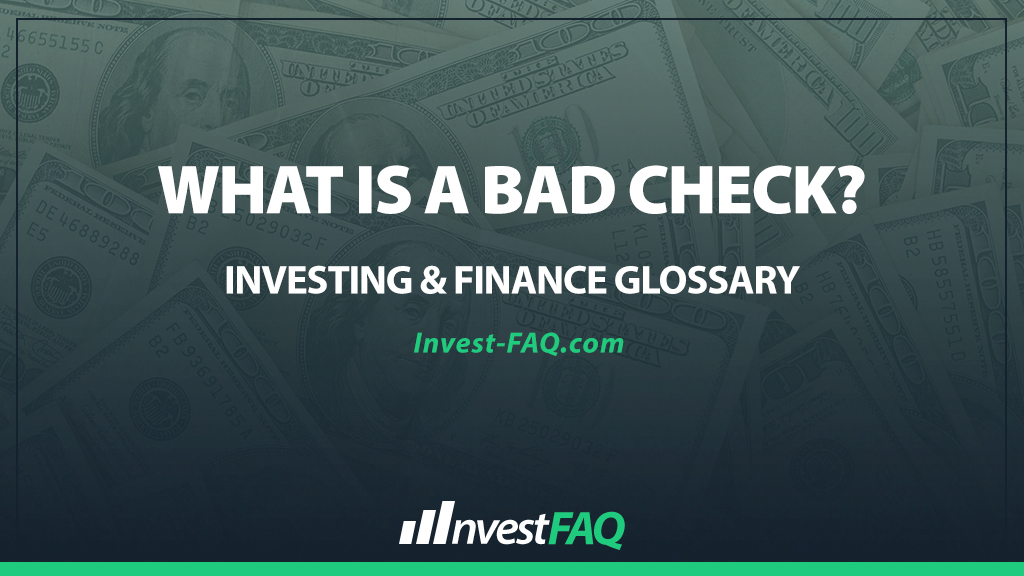 Bad Check
Bad Check
Contents
A bad check, also known as a bounced check or NSF (non-sufficient funds) check, is a check that cannot be processed because the account on which it was drawn does not have enough funds to cover the amount of the check. This situation results in the check being returned to the depositor without the desired funds being transferred.
In the business world, receiving a bad check can disrupt cash flow and financial planning. Businesses may charge a fee to the issuer of a bad check to cover processing costs and any additional penalties.
Moreover, frequent occurrences of bad checks might lead to stricter payment policies or legal action to recover the owed amounts. Companies also use accounting practices to track and manage bad checks to mitigate potential financial impacts.
Example of a Bad Check
Imagine Lovely Furnishings, a furniture store, sold a sofa set for $2,000 to a customer who paid with a check. When Lovely Furnishings deposited the check, it was returned due to insufficient funds in the customer’s account.
In their accounting records, Lovely Furnishings would initially record the sale with a debit to Cash and a credit to Sales Revenue for $2,000. Upon notification of the bounced check, the entry is reversed: Cash is decreased (credited) by $2,000, and Accounts Receivable is increased (debited) by $2,000, indicating the amount is still owed by the customer. Additionally, any fees charged to the customer for the bounced check would be recorded as a debit to Accounts Receivable and a credit to Miscellaneous Income.
This example illustrates how a bad check impacts a business’s accounting processes. Initially, the business expects to increase its cash holdings by the amount of the sale. However, the bounced check forces the company to reverse this transaction and recognize that the cash inflow they counted on did not materialize, affecting their cash flow and potentially their ability to cover their own expenses.
The adjustment in accounting entries reflects the true financial position of the business, acknowledging the unpaid sale and any costs incurred due to the bounced check.
Significance for Investing & Finance
Understanding and managing bad checks is crucial in accounting for several reasons:
Cash Flow Management: Accurate tracking of bad checks is essential for managing a company’s cash flow effectively. Recognizing these events promptly ensures that financial statements accurately reflect the company’s cash position.
Financial Analysis: The treatment of bad checks affects the analysis of a company’s financial health. Regular occurrences may indicate issues with credit policies or customer selection, requiring adjustments to minimize financial risk.
Internal Controls: Procedures for handling bad checks, including timely recording, follow-up actions, and adjustments to accounting entries, are part of a company’s internal controls. These controls help safeguard the company’s assets and ensure the integrity of its financial reporting.
In summary, a bad check represents not just a failed transaction but a broader financial risk that businesses must manage through diligent accounting practices and internal controls. By accurately recording and addressing these incidents, companies can maintain stable cash flows and mitigate the impact of insufficient funds on their operations.
FAQ
What immediate action should a business take upon receiving a bad check?
Upon receiving a bad check, a business should first contact the customer to seek resolution, either through payment replacement or arranging an alternative payment method. Simultaneously, the business should adjust its accounting records to reflect the unresolved payment.
How does a bad check affect a company’s financial statements?
A bad check results in the reversal of any initial revenue recognition associated with the check, impacting the company’s cash balance and accounts receivable until the issue is resolved and the payment is successfully collected.
Can a company charge a fee for a bad check?
Yes, most businesses impose a returned check fee on the issuer to cover bank fees and administrative costs incurred due to the bad check, which is legally permissible in many jurisdictions.
What are the long-term implications of frequently accepting bad checks for a business?
Frequently accepting bad checks can lead to cash flow disruptions, increased administrative costs, and might necessitate stricter credit and payment policies to mitigate the risk of future payment failures.
